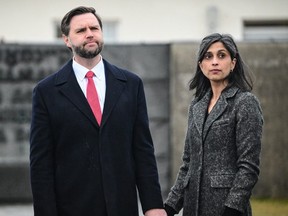
Contents of the article
Vice President J.D. Vance, who drew scrutiny this week for saying he hoped his Hindu wife would convert to Christianity, hit out at critics on Friday, accusing them of “anti-Christian bigotry.”
Advertisement 2
Contents of the article
At an event sponsored by Turning Point USA in Mississippi on Wednesday to honor slain activist Charlie Kirk, Vance was asked about raising three children in an interfaith marriage to Second Lady Usha Vance. The questioner asked why conservatives seem to have made Christianity a requirement to be considered a patriotic American.
Contents of the article
Recommended Videos
Contents of the article
“Yes, my wife was not raised Christian. I think it's fair to say she was raised Hindu, but not particularly religious in either direction,” Vance responded, adding that both he and his wife were “agnostic or atheist” when they met and later decided to raise their children together as Christians.
Contents of the article
Advertisement 3
Contents of the article
“Usha usually goes to church with me on Sundays,” Vance added. “Do I hope that she will end up being touched in some way by the same things that touched me in church? Yes, I honestly wish that. Because I believe in the Christian gospel and I hope that over time my wife will come to the same view of it. But if she doesn't, then God says everyone has free will, and so it's not a problem for me.”
The University of Mississippi vice president's comments sparked backlash, and Vance on Friday shared a post on his official X account defending his comments. His post came in response to a user who said Vance publicly threw his wife's religion “under the bus” to pander to Christian nationalists.
Advertisement 4
Contents of the article
“My Christian faith tells me that the gospel is true and beneficial to people,” Vance wrote.
He said his wife “is not a Christian and has no plans to convert, but like many people in an interfaith marriage – or any interfaith relationship – I hope one day she can see things the way I do.”
Vance said comments like the ones he responded to on X “smack of anti-Christian bigotry.”
He continued: “Yes, Christians have beliefs. And yes, those beliefs have many consequences, one of which is that we want to share them with other people. This is a completely normal thing, and anyone who tells you otherwise has their own agenda.”
Vance, a Catholic convert who has written publicly about the evolution of his faith for years, has at times positioned himself as something of a theologian-in-chief, trying to justify Trump administration policies through a religious lens.
Advertisement 5
Contents of the article
Some religion and politics experts say the vice president has offered more theological interpretations and analyzes of Christianity – in addition to simply commenting on his personal faith – than any other White House official in his memory.
Vance recently returned from a trip to Israel, where he and his wife attended a private Mass at Jerusalem's Church of the Holy Sepulcher, which Christians believe is the site where the body of Jesus Christ once lay.
Immediately after taking office, Vance justified the Trump administration's increase in mass deportations of migrants by saying that Christianity calls on people to “love your family” and then continue to love people.
“A lot of people on the far left have completely turned that around,” he said. “They seem to hate the citizens of their own country and care more about people outside their borders.”
Advertisement 6
Contents of the article
In February, he spoke at the International Religious Freedom Summit, declaring that “we owe the very concept of religious freedom to Christianity,” an argument popular in some conservative circles.
A few days later, Pope Francis wrote a remarkable letter to the U.S. bishops condemning Vance's theological analysis.
“Christian love is not a concentric expansion of interests,” Francis wrote, urging American bishops to see the true face of Jesus in migrants.
Vance subsequently met with Francis the day before the Pope's death.
In an interview with the “Pod Force One” podcast published earlier this week, Vance said his charitable interpretation of the Catholic Church's position on immigration is that while “nations are allowed sovereignty,” migrants deserve recognition of their humanity.
“A lot of people who come to our country are struggling in some way,” Vance said. “They are human beings, and while we have to deal with immigration enforcement, I try to remind myself that this is consistent with the teachings of the church: yes, it doesn’t mean we can allow these people to remain in our country, but I have a responsibility to try to remember their humanity.”
Contents of the article







